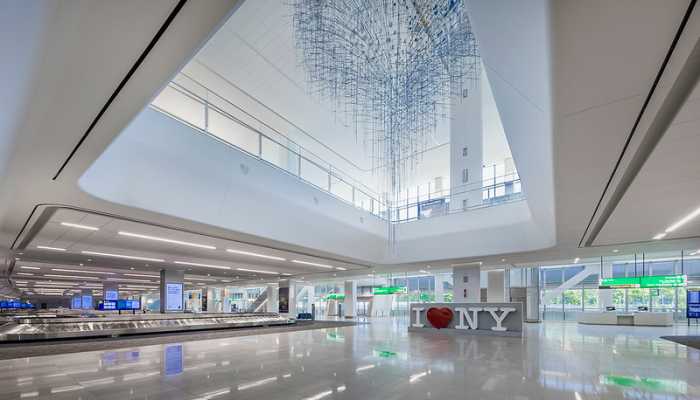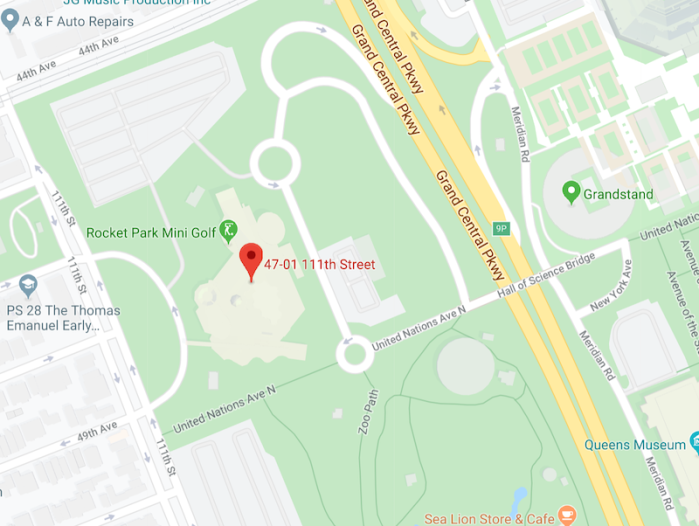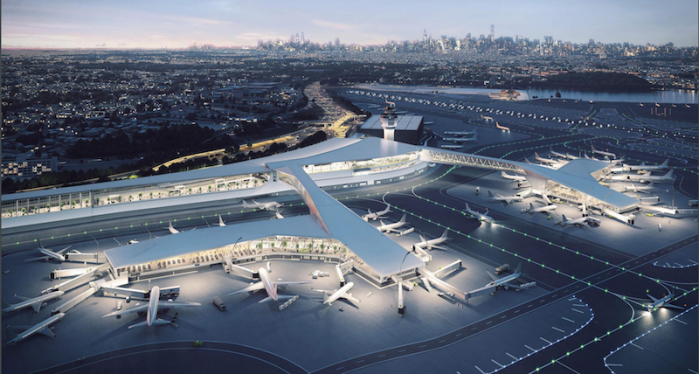Assemblymember Jeffrion Aubry (D- East Elmhurst, LeFrak City, parts of Corona, Woodside, Jackson Heights, Elmhurst) has represented the 35th Assembly District for 28 years.
This year he’s being challenged by controversial candidate and former politician Hiram Monserratte, who was the first state senator to be expelled from the New York State Senate in nearly a century after he was convicted of assaulting his girlfriend in 2009. He then pled guilty to misusing city funds in 2012 and was sentenced to two years in prison. After being elected as a district leader in 2018, Monserrate’s attempt at Aubry’s seat is his next step in his attempt to reenter politics.
Queens County Politics (QCP) spoke with the Assemblymember Aubry on the phone. The questions and his answers are edited for length and clarity.
The first three questions were sent to Monserratte’s campaign as well but they did not respond.
QCP: Beyond defunding police departments and the other proposals on the table lately, what would you propose legislatively to ensure true accountability in police departments around the state?
Aubry: We have done 50-A. We’ve passed a series of bills which we think are directly associated with providing that kind of oversight. I think we’re going to be in a position to try and ensure their operation and to monitor this effort which we think might need legislation out of the governor to require the police departments to reimagine themselves –– to work with communities, to come up with policing plans that are respectful of the neighborhoods, particularly the minority neighborhoods, that they are engaged with. I think sometimes an executive order is not sufficient. You need law in order to ensure that the operations are completed and that there is a finality to it, that somebody can’t go to court. They can’t sue a police department or any entity if there is no law there. An executive order is not something you can take to court. I think that might be where we’ll be headed as far as that is concerned.
I think ensuring the representation of affected communities in the police department is important. You can’t come from a culture outside of a particular neighborhood and easily learn how to move in that neighborhood. The more representative a police department is of the communities that they represent, the better opportunity for justice to be a little bit fairer.
We have to look at this relationship between the district attorneys and the police department in order to ensure justice. The district attorneys who rely on police departments to make their cases, sometimes that is a prejudicial relationship. And so when a police officer has violated the law relative to his duties, the district attorneys are not so wound up with the police department that they are reluctant to bring cases. I think that is an important component, even with the standard review by the attorney general on police deaths to civilians. It can be charges of abuse that need to be investigated and need systemic change in the department.
I think there are a few things that will evolve as we go through this passage. I think you have to wait to see how the first round goes quite frankly. These are long term battles. This is not going to be quick, quick, quick and a bill will solve the problem. I have said in the Black Lives Matters protests that we had that no law changes the human heart. How do you make a police officer understand that it’s a human being that he’s dealing with and not an object and use discretion? I think that goes back to making sure that policemen are representative of their communities and have some affinity with the people that they serve. And that doesn’t mean that they always have to be exactly in the same racial category but they have to have some sense of humanity. I don’t think we test police officers for humanity when they go through training.
QCP: What do you see as the biggest challenge for the state’s recovery from the COVID-19 pandemic and the resulting budget cuts, and how would you combat it legislatively?
Aubry: It’s clear: resources, resources, resources. We are not going to be able to recover economically without a stimulus package that provides funding to both the state and local municipalities. It’s just not going to happen. The PAUSE has caused us to lose extraordinary amounts of tax money and to ensure the basic services that government should provide and needs to provide, you’re going to have to have that. So that’s continuing pressure on Congress, Senate and the president to deliver what we need in order to do that. In the absence, or in between that, I think we have to look at how we use the money that has already been brought down because I believe the government is sitting on some of that money.
We have to go back and look at what the Medicaid cuts are going to be. Elmhurst hospital, which has been at the center of this fight for Queens, and for the city quite frankly, we have to make sure that it has sufficient resources to continue to do the work. We passed the bill that forces the New York State Department of Health to look at the underlying causes of the deaths in our community, which was so high as opposed to others. We know that health conditions –– diabetes, heart disease –– are overrepresented in minority communities.
It’s interesting that the same communities that are over-policed, are underfunded for medical and psychological services, right? There’s linkages here and they are economically deprived. There’s a history of struggle here that people have to pay attention to and I know that it’s reached a point where it appears that the country is coming to understand that and to recognize it and to demand change and that’s good. And so you’re going to see that demand, as we already have, in the change in policy. And it isn’t just about walking the streets today. It’s about changing policy for tomorrow and the future.
QCP: What do you think is the most forgotten or not talked about issue facing New York State today and why? And if elected, what would you do to fix it?
Aubry: Well, I think I just told you. The most forgotten is the inequities of poverty in this state. So you can take the second answer. I don’t think any other issue rises above that. We would not have burning and fighting and struggle in the streets if there was an issue that was higher than that. Economic inequality in our city and our state.
The undocumented who can’t get public benefits and who live on the margins and the informal economy, they’re in my community. They’re in my district. They’re all over the state. We have to find a way to bring them into the legitimate part of our economy and into the legitimate part of our schools and education systems because they are here. They’re not going away. Over the last 28 years, we’ve watched that population grow. We attract them because we are New York state. They come here because they know that opportunity exists. We have to help that sense of opportunity be realized.
Also, we have to pay homage to the Supreme Court ruling that just passed that provides the protections of the law to individuals who are gay, lesbian, trans and living lifestyles of their choice in this country. Even though in New York, we may be more liberal in some ways, there’s still opportunities that have been denied to people because of their sexual orientation.
QCP: Is there anything else I should have asked you?
Aubry: You should have asked me, “Why have you stayed in the New York State Assembly for the last 28 years?”
QCP: Okay, why have you stayed?
Aubry: I grew up in this neighborhood. For all my life I have served and worked in this community from working at the not for profit, to working in the Borough President’s office to going to the Assembly. This neighborhood has been a lifeblood to me and I continue to find that there are tasks to be done. I bring the type of background and the experience in this neighborhood that best represents it.
And, I came to this state as a baby, my mother and father taking us away from the segregated south to come here to find freedom. I understand the same dynamic, it exists for people who have come from the Domincan Republic and Ecuador and Mexico and Colombia. I know that this is ground where we have been able to find a better life and I think that’s what people come to my neighborhood for.
I also was energized by working in the criminal justice field as Chair of Corrections for a very long time, working on important issues from the Rockefeller Drug Laws, changing the way in which people who have mental illness are treated in prisons, and reducing the telephone costs for prisoners and generally trying to work for folks who always come home. They come home to our neighborhoods and they need to be better prepared to live in an honest, decent circumstance than what the prison system does now.
I have lots of issues that keep driving me that I believe in and continue to work for as part of this community, as part of the 35th Assembly, as a citizen of it, and as a lifelong resident. That’s why I stayed 28 years.
QCP: Where down South are you from?
Aubry: My family is from New Orleans, Louisiana. Best food there is, in my opinion. My mother was a great Louisana cook. And then a little bit of time, I spent in Mobile, Alabama with my grandmother. In those days merchant marines couldn’t come and stay in the same hotel even though they’d stayed on the same ship so there was a seaman’s hotel in Mobile and a colored seaman’s hotel which my grandmother ran.
I spent summers down there so I understood the South. Those were in the ‘50s when the South was not so civilized. I understand water fountains that are for you and where you can sit in movie theaters and walking down the street away from where somebody who was white could walk. I felt that as a young person. Mobile is hot. Boy, let me tell you. But you weren’t allowed to swim in the pool because it was not integrated.
QCP: Some people say that right now we’re engaged in the largest civil rights movement since the Civil Rights Movement. Do you think that’s the case?
Aubry: The difference between then and now is the immediacy of information, in my mind. The fight was there, and certainly, the pictures of Selma and the atrocities that were committed in the civil rights marches were galvanizing in the country and caused all sorts of changes to happen even if they were slow changes and not as broad-based as one might have liked. The march on Washington, the murders of Malcolm, and Medgar and Martin, the three college kids who were killed. They hit us, but we didn’t see it. I think the difference is that we cannot avoid it because we are seeing it.
I think it also was because we are in a PAUSE. We’ve had these kinds of police incidents in the past. We can list the names all the way up and down the line in New York City. You can list the names of people who were shot by police. We all know about those but, because of technology, you get to see it in person. And because we were on pause, you get to pay attention. I’m not so sure that if we were in our normal cycle of life, “I’m worried about this,” “I’m worried about that,” “I want to go to a party,” “I’ve got to get a job,” “I’ve got to raise my kids,” all the things that people –– black and white, whatever color –– get absorbed in, that it may not have been as dynamic.
Because you are on PAUSE and because the technology has advanced so much that you see things in real time, I think that’s what ignites it. The response is also governed by the same technology because people have cameras and so when the protests go on, you’re seeing it. When the protest went on for Rodney King, i don’t think you had as much on site, on time view.
And, I think we were ready for a return to humanism quite frankly. I think the president has forced us to look at our humanity because he clearly doesn’t exhibit it. So it’s that contradiction of things that make this a special time and hopefully a sustained time where we will get real work done. But as I’ve said at these rallies marching in the neighborhood, legislation doesn’t change the human heart. And that’s the business that we’re about. People will not change their behavior unless their heart changes. That’s still a battle as you can see. As much as a certain portion of the community is rising up, you see a recalcitrance in others who see the world in another way. So that’s a continual battle but I think we have an advantage and I think for the most part the media is paying attention. That, we think, will help sustain this and make these improvements real and sustaining and long term.










